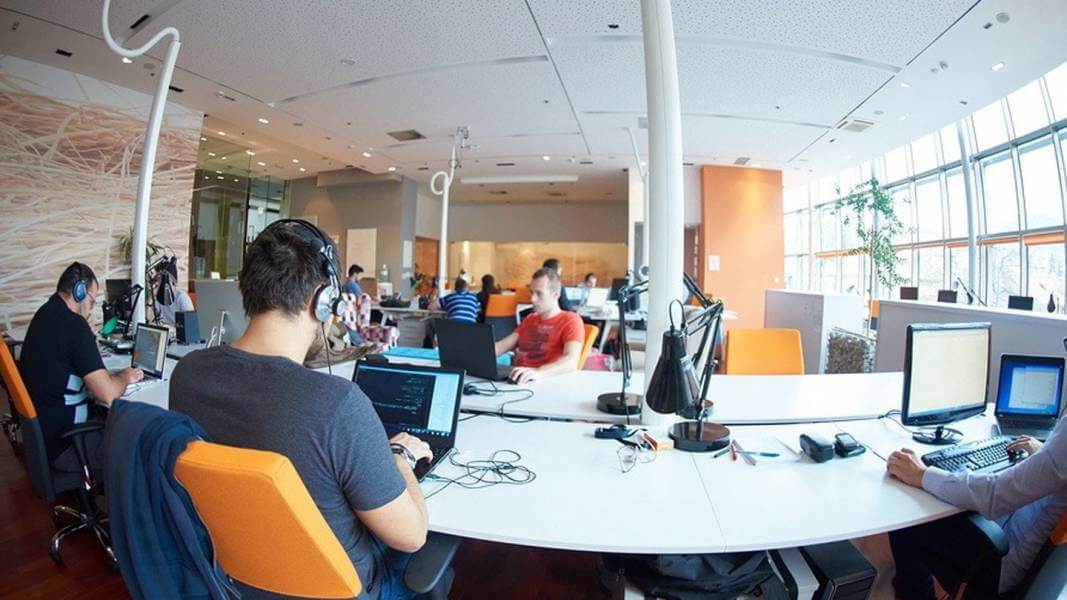App development continues to evolve and, year after year, we also see new trends. Technology has come far in recent years, and with the growing need for apps for IoT devices, new use cases continue to emerge. When it comes to app development, here are some of the ways that technology can be used now and in the future. There has been a steady growth of industries adopting these tech trends in 2021, so it’ll be exciting to see how they move us forward.
 Blockchain Technology
Blockchain Technology
Most of the problem with a large and open internet is safety and security. Companies spend millions of dollars a year focused on securing data and creating systems that are difficult to hack into. Blockchain technology is causing innovations in this sector, including when it comes to app development. Whether you’re talking about mobile apps or apps for the computer, blockchain technology has significant benefits.
When it comes to smart contracts, for instance, the blockchain records the information in a way that makes it difficult to hack. The information is decentralized, meaning a smart hacker would need to break into multiple locations to get all the data they want. This becomes more of a hindrance as they are used to hacking open only one system to steal information. Apps built on blockchain experience fewer bugs and cannot be pirated the same way that traditional apps can be.
5G
The installation of more 5G towers throughout 2021 has opened more opportunities for technology that leverages these 5G capabilities. What this means is that apps and devices that connect to these networks will be faster and more responsive than previous generations. The possibility for real-time documentation in the cloud becomes more of a reality with 5G networks. Beyond just having fast phone service, these devices can be used in healthcare and other industries.
IoT
The more apps that are developed, the more opportunity there is for the internet of things. While your smart fridge might be able to tell you you’re low on food, what if it could also link to an account where it could order it directly and have it sent to your door? Or what if it could automatically add it to your grocery list? This is where the IoT has taken us in 2021. The more apps that can be developed for these kinds of devices, the more robust and helpful their services can become.
Mobile Wallets
Maybe you only use the Target app to pay when you get to the store. Or perhaps you’re an avid cryptocurrency investor. If so, then you’re likely already familiar with the concept of a mobile wallet. Or perhaps, you’re just getting your feet wet in this area and you’re learning more. The future of paying for your essentials is with a mobile wallet. You’ll find that 2021-2022 has more opportunities to expand apps that you can securely pay with. This innovation helps protect you and means there are less things for you to carry around. Mobile wallets are protected with secure passwords and/or biometrics.
Augmented Reality
The great thing about this technology is that it can be used for something fun, or even something helpful and useful. App-based games that blend the real world with amazing virtual worlds make for fun and exciting experiences. Or you can use augmented reality to find the perfect makeup shade, the best couch for your home, or to create realistic 3-D models. The applications of this technology are endless and will ultimately permeate every industry in some way.
Virtual Events
Throughout 2020 and 2021 more and more companies have leveraged online events. The global pandemic accelerated this need, but more apps are creating robust features for virtual events. This is more than a livestream. You can connect with other users, download materials for conferences, learn interesting facts about concerts, and so much more. Virtual event apps are being used in business and in entertainment to take virtual meetings to a whole new level.
With the right user experience design, these apps can help you get your most important questions answered in real-time. And with the continued development of these apps, some events may never meet in person again. In turn, this can mean big savings for attendees and can open spots to even more people.

Founder Dinis Guarda
IntelligentHQ Your New Business Network.
IntelligentHQ is a Business network and an expert source for finance, capital markets and intelligence for thousands of global business professionals, startups, and companies.
We exist at the point of intersection between technology, social media, finance and innovation.
IntelligentHQ leverages innovation and scale of social digital technology, analytics, news, and distribution to create an unparalleled, full digital medium and social business networks spectrum.
IntelligentHQ is working hard, to become a trusted, and indispensable source of business news and analytics, within financial services and its associated supply chains and ecosystems


 Blockchain Technology
Blockchain Technology







